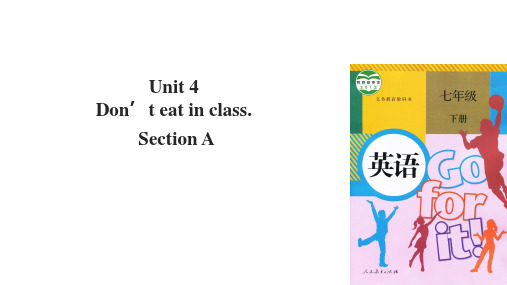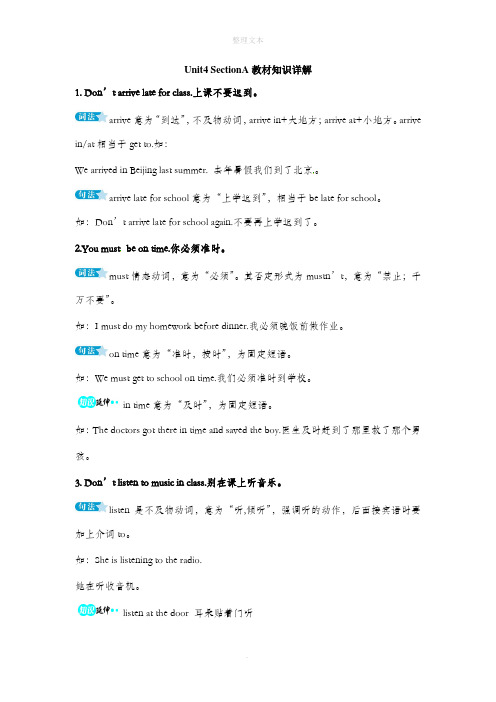人教版初中英语七年级下册Unit4SectionA教材全解
- 格式:doc
- 大小:126.50 KB
- 文档页数:6






Unit 4 Don’t eat in class.Section A 2a—2d ( P20 )* 教师寄语:No rules, no standards. 没有规矩,不成方圆。
【学习目标】【学习重点】:1、学习掌握本节课的生词和短语;2、巩固祈使句的用法;3、学习情态动词can表示许可的肯定句、否定句、一般疑问句及肯定、否定回答。
4、提高学生的听说能力。
【体验学习】:I、预习交流1. 根据音标拼读单词并牢记;2. 自学课文,勾画出重点和疑惑。
II、翻译官1. eat outside ________________2. wear a hat ___________________3. a lot of ___________________4. be late for class_______________5. 不得不__________________6. 穿校服_____________________7. 保持安静________________【课堂导学】:I、新课呈现Step1 RevisionReview the school rules at P19.Step2 PresentationPresent key sentences in this period.This is a great school, but there are a lot of rules.Can we bring music players to school?And we always have to wear the school uniform.And we also have to be quiet in the library.Step3 ListeningListen and finish 2a and 2b. Check the answers.Step4 Pair workTalk about the rules in 2a.Step5 Role-playRole-play the conversation in 2d.II、合作交流Group work: 分析总结情态动词can的用法,并练习造句。



人教版初中英语七年级下册Unit4SectionA教材全解Unit 4 Don’t eat in class.Unit 4 Section A教材全解1.Don’t arrive late for class.上课不要迟到。
【重点注释】①这句是祈使句的否定形式(Don’t +行为动词原形+其他),用于表达命令、请求等。
祈使句可以表达说话人的意愿、请求、叮嘱、号召、命令或建议,它的主语(听话人)通常省略,谓语动词用原形,句子末尾用感叹号或句号。
例如:Don’t throw the ball like that.不要那样扔球。
②arrive late for与be late for同义,都表示“做某事迟到”。
arrive late for侧重到达的时间晚,be late for侧重状态。
例如:Don’t arrive late for the meeting next time.=Don’t be late for the meeting next time.下次开会别迟到了。
③arrive不及物动词,意为“到达,抵达,来到”,不能直接跟名词作宾语,但可以接介词at或in,构成短语“arrive at/in+地点(at+小地方,arrive at the bus stop;in+大地方,arrive in Beijing)”,意为“到达……”;arrive后若是here,there,home 等地点副词,则不需要加in或at等介词(arrive here/there/home)。
例如:He arrives at the bus stop at 8 o’clock every morning.他每天早晨8点到达公共汽车站。
When did you arrive in Beijing?你什么时候到北京的?I arrive home at 4:00 in the afternoon.我下午4点钟到家。
【辨析记忆】arrive,reach与get①arrive和get都是不及物动词,前者较正式,后者则较口语化。

人教版初中英语七年级下册Unit4SectionA教材全解Unit 4 Don’teat in class.Unit 4 Section A教材全解1.Don’tarrive late for class上.课不要迟到。
【重点注释】①这句是祈使句的否定形式( Don’ t +行为动词原形 +其他),用于表达命令、请求等。
祈使句可以表达说话人的意愿、请求、叮嘱、号召、命令或建议,它的主语(听话人)通常省略,谓语动词用原形,句子末尾用感叹号或句号。
例如: Don’t throw the ball like that.不要那样扔球。
② arrive late for 与 be late for 同义,都表示“做某事迟到”。
arrive late for 侧重到达的时间晚, be late for 侧重状态。
例如: Don’t arrive late for the meeting nexttime.=Don’t be late for the meeting next time下.次开会别迟到了。
③arrive 不及物动词,意为“到达,抵达,来到” ,不能直接跟名词作宾语,但可以接介词 at 或 in,构成短语“ arrive at/in+地点( at+小地方 ,arrive at the bus stop;in+大地方 ,arrive in Beijing )”,意为“到达⋯⋯”;arrive 后若是 here,there,home 等地点副词,则不需要加in 或at 等介词(arrive here/there/home)。
例如:He arrives at the bus stop at 8 ’o clock every morning.他每天早晨 8 点到达公共汽车站。
When did you arrive in Beijing? 你什么时候到北京的? I arrive home at 4:00 in the afternoon.我下午 4 点钟到家。



Unit4 名师教材解读1.0T extbook Analysis教材解读本单元以“规章制度(Rules)”为话题,围绕功能“能简单谈论规章制度(Talk about rules)”,学习否定祈使句(Don’t)陈述规章制度,情态动词(have to, must, can, can’t)来谈论规章制度, 情态动词can表示许可。
话题与学生日常生活密切相关,学生有话可说,容易激发学生学习兴趣。
Section A主要围绕学校,以教室外墙张贴校规的单元主题图呈现书面语体的规章制度,再通过听说活动导入口头谈论规章制度的主题情景中,学生能够感知、理解、学习不同语体中关于话题的表达。
通过主题情景下的初步感知功能句型(Don't..., can’t ...but can..., can…and also can..., must do..., have to do...)的意义后,再通过对语法结构规律的发现、归纳、强化练习,加强对话题和功能句型在意义和结构、流利与精准上的综合理解和运用,为Section B话题的拓展和更进一步的综合理解和运用打下基础。
Section B将规章制度话题下的情景由“学校”转移到了贴近学生真实生活的“家庭”。
在单元话题牵引下对Section A的词汇进行循环复现、拓展运用,在功能牵引下对Section A的功能句型)进行深化理解和运用。
同时Section B 围绕“家庭”规章制度进行听说训练外,偏重读懂关于家庭规章制度的文章,并能熟练运用目标句型写出家庭和学校的规章制度。
完成单元在发展听、说、读、写技能以及语言综合素养的培养和提升的学习目的。
1.1Section A 1a 活动1a是一个基于单元话题的主要词汇和基本句型引入活动,利用学生常见的教室外墙张贴的校规的形式呈现书面语体的规章制度。
通过主题图张贴的校规,便于激活学生的背景知识,使他们利用已有的学习经验进行新知建构。
比如:主题图熟悉单元话题牵引下的词汇和功能句型,“Don't”表示“不”后接动词原形,学生基本能理解核心句型“Don’t...”的意思;已经学过的动词run/ eat/ be late for等能够帮助学生较为主动地理解新知“Don’t run/ eat/ listen to/ fight”表达“禁止....不准...”的意思。

Unit4 SectionA教材知识详解1. Don’t arrive late for class.上课不要迟到。
arrive意为“到达”,不及物动词,arrive in+大地方;arrive at+小地方。
arrive in/at相当于get to.如:We arrived in Beijing last summer. 去年暑假我们到了北京。
arrive late for school意为“上学迟到”,相当于be late for school。
如:Don’t arrive late for school again.不要再上学迟到了。
2.You must be on time.你必须准时。
must情态动词,意为“必须”。
其否定形式为mustn’t,意为“禁止;千万不要”。
如:I must do my homework before dinner.我必须晚饭前做作业。
on time意为“准时,按时”,为固定短语。
如:We must get to school on time.我们必须准时到学校。
in time意为“及时”,为固定短语。
如:The doctors got there in time and saved the boy.医生及时赶到了那里救了那个男孩。
3. Don’t listen to music in class.别在课上听音乐。
listen是不及物动词,意为“听,倾听”,强调听的动作,后面接宾语时要加上介词to。
如:She is listening to the radio.她在听收音机。
listen at the door 耳朵贴着门听listen for …等着听…listen for an answer 等着听回答listen to a lecture 听讲座listen to advice 听从劝告4.Don’t run in the hallways!不要在走廊里跑步!1)用于表达命令、请求、劝告、警告、禁止等的句子叫做祈使句。



人教版初中英语七年级下册Unit4SectionA教材全解Unit 4 Don’t eat in class.Unit 4 Section A教材全解1.Don’t arrive late for class.上课不要迟到。
【重点注释】①这句是祈使句的否定形式(Don’t +行为动词原形+其他),用于表达命令、请求等。
祈使句可以表达说话人的意愿、请求、叮嘱、号召、命令或建议,它的主语(听话人)通常省略,谓语动词用原形,句子末尾用感叹号或句号。
例如:Don’t throw the ball like that.不要那样扔球。
②arrive late for与be late for同义,都表示“做某事迟到”。
arrive late for侧重到达的时间晚,be late for侧重状态。
例如:Don’t arrive late for the meeting next time.=Don’t be late for the meeting next time.下次开会别迟到了。
③arrive不及物动词,意为“到达,抵达,来到”,不能直接跟名词作宾语,但可以接介词at或in,构成短语“arrive at/in+地点(at+小地方,arrive at the bus stop;in+大地方,arrive in Beijing)”,意为“到达……”;arrive后若是here,there,home 等地点副词,则不需要加in或at等介词(arrive here/there/home)。
例如:He arrives at the bus stop at 8 o’clock every morning.他每天早晨8点到达公共汽车站。
When did you arrive in Beijing?你什么时候到北京的?I arrive home at 4:00 in the afternoon.我下午4点钟到家。
【辨析记忆】arrive,reach与get①arrive和get都是不及物动词,前者较正式,后者则较口语化。
两者之后均不可直接接宾语,但可直接接here,there,home之类的表地点的副词作状语。
例如:What time does the train arrive?火车什么时候到?We got /arrive here last night.我们昨晚到这儿的。
②要表示“到达某地”,需借助适当介词:arrive之后通常接介词at(一般用于较小的地方)或in(一般用于较大的地方),而get 之后通常接介词to。
例如:We arrived at the station five minutes late.我们到车站晚了5分钟。
They will arrive in Paris next Monday.他们将于下周一到达巴黎。
When we got to the park,it began to rain. 我们到达公园时,就开始下雨了。
③reach通常是及物动词,(较get更正式),其后可直接跟地点名词做宾语(不能用介词)。
reach之后也可接here,there,home等词。
例如:He reached Beijing yesterday.他昨晚到达北京。
When did he reach home yesterday?昨天他什么时候到家?[注意]reach除可表示到达某地外,还用于其他意义的到达。
例如:Your letter reached me last week.我是上周收到你的信的。
He reached school age.他已达到上学——Sorry,I don’t know.A.getB.arrive atC.reach(get为不及物动词,表示到达某地时用get to,故排除A;arrive为不及物动词,arrive at后接小地点,arrive in后接大地点,由空格后Shanghai(上海)可排除B;reach为及物动词,后可直接跟地点,答案:C。
)2.You must be on time.你一定要守时(你必须准时)。
【重点注释】①must为情态动词,意为“必须,务必,一定”。
情态动词不能单独作谓语动词,必须和动词原形一起构成谓语。
例如:You must read a book before you watch TV.【拓展记忆】①must用于否定句时,mustn’t意为“千万不要,禁止”,而不表示“不必”。
例如:You mustn’t be late for school.你千万不要上学迟到。
②以must 开头的一般疑问句,若作否定回答,可以用needn’t或don’t have to,但不能用mustn’t(一定不,不允许,不得。
如:You mustn’t smoke in the office.你不得在办公室吸烟。
)。
例如:——Must I clean all the rooms?我必须打扫所有的房间吗?——No,you needn’t/don’t have to.不,你不必。
[该句肯定回答:Yes,you must.是的,你必须(马上打扫)。
]【试题链接】We be carefull when we’re walking across the road.There’re too many cars now.A.canB.mayC.mustD.could(can“能,能够”;may“可以”;must“必须,一定”;could“可能”。
由句意“当我们过马路的时候必须小心,现在有太多车。
”可知C项符合题意。
)②on time为固定短语,表示“按时;准时”,指按规定的时间或指定的时间做某事;而in time表示“及时”,指不迟到或在规定时间之前或接近所规定的时间做某事。
例如:We must arrive there on time.我们必须按时到达那里。
At last,we reached the factory in time.最后,我们及时到达了工厂。
We were in just in time for the bus.我们正好赶上了汽车。
The train came on time.火车整点到站。
3.Don’t run in the hallways.不要在走廊里奔跑。
【重点注释】此句是祈使句的否定形式。
祈使句是表示请求、命令、劝说、建议等语气的句子。
在祈使句中,通常省略第二人称主语you。
其肯定句式以动词原形开头,否定句式是在动词原形前加don’t。
常在句首或句末加please以示礼貌。
句末用please时,前面通常加逗号。
例如:Stop talking!停止谈话!Don’t play football in the street.不要在街上踢足球。
Come in ,please./Please come in.请进来。
Please don’t stand up./Don’t stand up,please.请不要站起来。
4.Don’t listen to music in class.不要在课堂上听音乐。
【重点注释】①listen to music意为“听音乐”,其中listen为不及物动词,其后接宾语时,要加介词to。
例如:Listen!The girl is singing.听!那个女孩正在唱歌。
Listen to the teacher carefully,please.请认真听老师讲课。
Do you usually listen to music?你是不是经常听音乐呢?下课后)。
例如:Do you listen to your teacher carefully in class?你在课上认真听老师讲课吗?Let’s talk about the singer after class.让我们课下讨论那个歌手吧。
【拓展记忆】in the class意为“在这个班”。
例如:There are forty students in the class.这个班有40个学生。
类似的用法还有:in hospital住院—in the hospital在医院里at table吃饭—at the table在桌子旁5.Don’t fight.不要打架。
【重点注释】①fight此处作动词,意为“打架,争吵”,过去式是fought。
例如:Stop fighting,you two.你们两个人,别打了!②fight还可作名词,意为“打架,战斗(力),斗志”,have a fight打架,have a fight with sb.和……打架,win/ lose a fight赢得/失去战斗。
例如:Tom had a fight with his brother yesterday.昨天汤姆和他弟弟打架了。
They had a fight last night.昨晚他们打了一架。
fight about the toys.这两个男孩常因这些玩具而争吵。
We must fight with you.我们必须和你们一起并肩战斗。
Why do you sometimes fight with others?你为什么有时和别人打架?I’ll fight against you.我会反抗你。
6.Sorry,Ms.Clark.对不起,克拉克女士。
【重点注释】①sorry意为“对不起”,用于犯错误后或不能满足对方要求等时表示歉意。
例如:Sorry,I’m late.=I’m sorry I’m late.对不起,我迟到了。
Sorry,I can’t help you.对不起,我不能帮你。
I feel sorry for him.对于他,我觉得很抱歉。
,用于姓氏前面,是对婚姻状况不明的女子的称呼。
②Ms.意为“女士”——Well,we can’t arrive late for class.We must be on time.噢,我们上课不能迟到。
我们必须守时。
【重点注释】rule名词,意为“规则,规章”。
school rules校规,class rules班规,family rules家规,break the rules违反规定,obey/follow the rules遵守规定。
【拓展记忆】ruler名词,意为“尺子”。
8.wear a hat戴帽子【重点注释】wear为及物动词(同音词where;动词形式wear-wears-wearing-wore),意为“穿着;戴着”,表示状态。
例如:He wears a black T-shirt.他穿着一件黑色的T恤衫。
She likes wearing a red hat.她喜欢戴一顶红色的帽子。
【拓展记忆】put on意为“穿上;戴上”,强调穿、戴的动作;“be in+颜色/衣服”意为“穿着……颜色的衣服”,表示穿的状态(wear)。